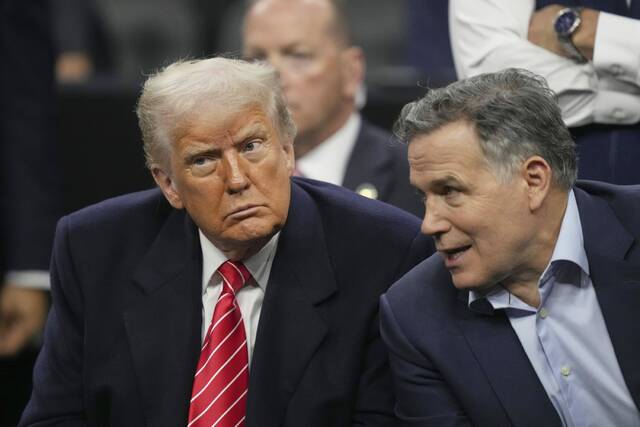Chat with Trump at wrestling match helped salvage U.S. Steel deal, McCormick says
Just days after being sworn into office, U.S. Sen. Dave McCormick had lunch with a group of U.S. Steel workers who favored the company’s sale to Nippon Steel.
That January meeting convinced the Pittsburgh Republican of the controversial deal’s merits, McCormick said Wednesday at the Hudson Institute in Washington, D.C.
It also made him determined to convert President Donald Trump, who alone had the power to decide whether the iconic American company could sell itself to a Japanese firm.
A conversation between the senator and the president during the NCAA wrestling championships in March proved pivotal.
McCormick and Trump sat side by side for two hours in a Philadelphia arena, starting a dialogue that led to an Oval Office invite.
In the intervening weeks, McCormick spoke with David McCall, a staunch deal opponent and leader of the United Steelworkers union.
“Honestly, he couldn’t make a good argument,” McCormick said.
Deepened in his conviction the deal would “supercharge the domestic steel industry,” McCormick made the case at a White House meeting. It ended in a change of heart from Trump after he spent more than a year warning the deal was a threat to national security and pride.
“This is for the working families that elected you and got you here,” McCormick said he told Trump. “I think that’s what pushed him over the edge.”
The White House did not immediately return a request for comment.
Trump approved the nearly $15 billion deal in June, reversing a block from former President Joe Biden. The government assumed veto power over certain key business decisions as a way to alleviate national security fears.
Three months later, officials from both companies joined McCormick at the Hudson Institute, a conservative think tank, to tout a productive start to their partnership.
“We’ve seen some early wins and, I think, some true synergies from this partnership when it comes to the technologies,” said Kevin Lewis, executive vice president and chief financial officer for U.S. Steel.
Nippon’s experience with massive blast furnaces has helped drive plans to upgrade the Gary Works in Indiana, according to Lewis.
The firm plans to spend $11 billion improving U.S. Steel facilities in the next three years, including at least $1 billion to replace an 87-year-old hot strip mill in West Mifflin.
An explosion at the Clairton Coke Works last month that killed two people and injured 10 others has put a renewed spotlight on the condition of the aging Mon Valley Works.
Nippon is also examining where to build a new electric arc furnace, Hiroshi Ono, president of Nippon Steel North America, told a small audience at the Hudson Institute.
“We are in a good position to commence the investments swiftly,” said Ono, who just moved to Pittsburgh from Houston and claims to have picked up a passion for the Pirates and Steelers in the process.
The companies had plenty of time to prepare for fast action — the deal was announced in December 2023 and sat in regulatory limbo for more than a year, often appearing on the verge of defeat only to be resurrected.
Nippon is also showing U.S. Steel how to make the steel needed for electric motors, a market poised to grow with the rise of electric vehicles.
“We do not possess any experience as a company in producing these very difficult products,” Lewis said. “Nippon, however, is a global leader in electric steel.”
U.S. Steel brings to the table a skilled workforce, strong reputation and market access that Nippon craves, according to Ono.
Steel demand in Japan has waned over the years, he noted, as the island nation’s population shrinks.
Together, the companies can produce up to 86 million tons of steel a year, according to Ono.
In terms of actual output, the companies combined are the fourth largest steelmaker in the world, nipping at the heels of Chinese steelmaker Ansteel for the third spot.
It was not that long ago, Allegheny Conference on Community Development CEO Stefani Pashman noted at the event, that U.S. Steel appeared doomed to a downward trajectory.
“It was not primed (to be) a future-focused company,” Pashman said. “It was not positioned to grow, and it was not looking very good on the market.”
Now, not only is this the beginning of a new era for U.S. Steel, she said, but other Japanese companies are showing interest in the Pittsburgh region.
She claims to have a few “live deals” for Japanese investment in the area and ongoing conversations with commerce organizations in the country. There are already about 150 companies from Japan with a Southwestern Pennsylvania presence, she said.
“For us, this is clearly because Nippon took a bet on us, sent a signal to the world Pittsburgh is open for business and it’s a place that welcomes Japanese partnership,” Pashman said.
Jack Troy is a TribLive reporter covering business and health care. A Pittsburgh native, he joined the Trib in January 2024 after graduating from the University of Pittsburgh. He can be reached at
Remove the ads from your TribLIVE reading experience but still support the journalists who create the content with TribLIVE Ad-Free.

